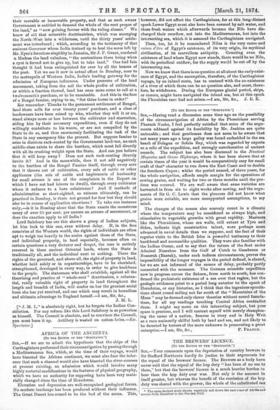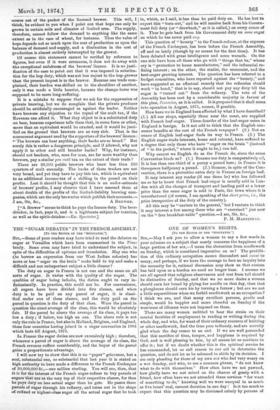THE BREWERS' LICENCE.
[TO THE EDITOR OF THE "SPECTATOR."] SIR,—Your comments upon the deputation of country brewers to Sir Stafford Northcote hardly do justice to their arguments for the repeal of the brewers' licence. The Brewers as a body have never said that the repeal of the hop duty "has been of no use to them," but that the brewers' licence is a much heavier burden to bear than the hop duty ever was. Not only is the amount in itself greater, but whereas the benefit of the remission of the hop duty was shared with the grower, the whole of the substituted tax
i The open-decked Arab dhows regularly sail down the east coast of Africa and across from Zanzibar to the Persian Gulf.
comes out of the pocket of the licensed brewer. This will, I 'think, be evident to you when I point out that hops can only be grown in certain soils and climates of limited area. The supply, therefore, cannot follow the demand to anything like the same -extent as in the case of wheat, for instance. Thus the value of hops depends not so much upon the cost of production as upon the balance of demand and supply, and a diminution in the cost of production is almost entirely intercepted by the grower.
Of course this statement cannot be verified by reference to figures, but even if it were erroneous, it does not do away with the exceptional unfairness of the brewers' licence. It is no justi- fication of the case to point out that it was imposed in substitu- tion for the hop duty, which was not less unjust to the hop-grower than the present impost is to the brewer. Because one trade com- plained, their burden was shifted on to the shoulders of another, only it was made a little heavier, because the change-horse was :supposed to be more long-suffering.
It is a mistake to suppose that we ask for the suppression of private brewing, but we do complain that the private producer -should be artificially encouraged as against the trader. Neither 'have brewers any objection to the repeal of the malt tax, if the Revenue can afford it. What they object to is a substituted duty on beer, because experience tells them that, in some form or other, snore than an equivalent would be exacted, and it would be justi- fied on the ground that brewers are so very rich. That• is the commonest argument used by the supporters of the brewers' licence : 4' The brewers can bear anything, their backs are so broad." But surely this is rather a dangerous principle, and if allowed, why not apply it to other and still broader backs? Why, for instance, ,should not bankers, who, man for man, are far more wealthy than • brewers, pay a similar pro rata tax on the extent of their trade?
There are 28,000 public brewers who brew less thaa 250 -quarters of malt annually. The backs of these traders are not very broad, and yet they have to pay this tax, which is equivalent to an additional income-tax of a shilling in the pound on their profits. Lest it should be thought that this is an under-estimate of brewers' profits, I may observe that I have assessed them at about double of the profits of the limited-liability brewing com- panies, which are the only breweries which publish their accounts.—
["A Brewer " seems to think he pays the licence duty. The beer- drinker, in fact, pays it, and is a legitimate subject for taxation, as well as the spirit-drinker.—En. Spectator.]







































 Previous page
Previous page